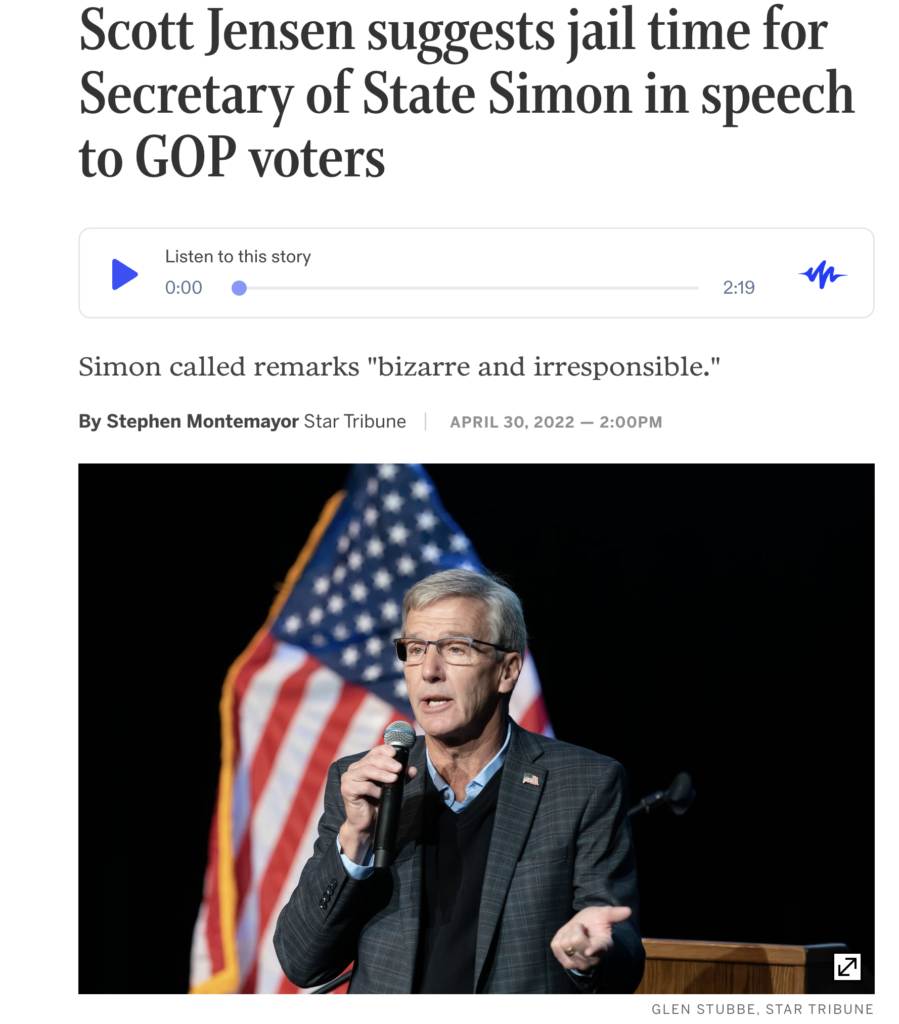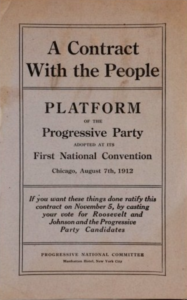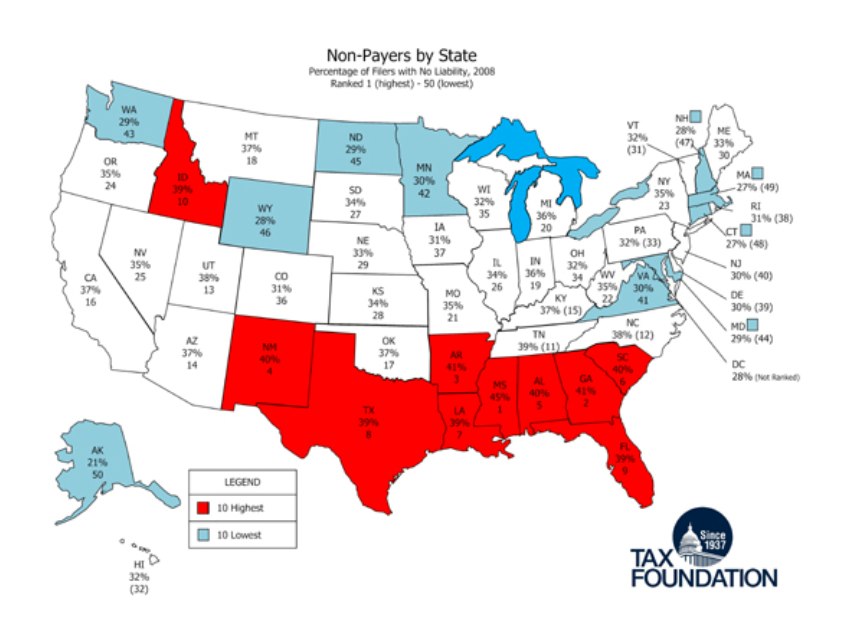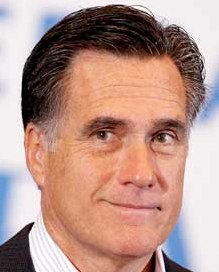It’s one thing to lie for political gain. That happens all the time. But until Donald Trump became a political figure, it was almost unheard of for politicians to incite angry mobs with unsubstantiated calls to jail political opponents.
But the disease of authoritarianism is contagious.

Recently, the Star Tribune obtained an audio recording documenting GOP gubernatorial nominee Scott Jensen sounding like a whole lot like a dictator.
Speaking April 23 at the Minnesota Third Congressional District Republican organizing convention in Plymouth, Jensen sparked loud cheers from the crowd when he warned that “the hammer’s coming down” on Simon, a DFLer.
“We are not voter suppressors. We have a simple attitude: Make sure that every ballot in the box belongs there. Make sure that it’s easy to vote, hard to cheat, and if you cheat, you’re going to jail,” Jensen said. “And Steve Simon, you maybe better check out to see if you look good in stripes, because you’ve gotten away with too much, too long under [Minnesota Attorney General Keith] Ellison, and the hammer’s coming down.”
Understandably, this Putin-esque moment in a state whose residents can’t stop telling the world how “nice” it is made national news. The audio shows that Jensen is stooping as low it takes to win authoritarian-loving Trump voters who get aroused bellowing “lock him up” about anyone with differing views.
Just because Jensen looks at first glance like a kindly made-for-TV doctor doesn’t mean this isn’t scary stuff. When a politician becomes willing to act like an authoritarian in order to appeal to voters with authoritarian instincts, that politician has become an authoritarian.
At the risk of becoming Secretary of State Simon’s cellmate, I must point out that Trump did lose. In fact, he lost “bigly,” by 7 million popular votes and 74 electoral votes, the largest popular vote loss by an incumbent president since Herbert Hoover. In 2020, Trump lost by the same margin that Trump in 2016 characterized as a “landslide.” Trump’s 2020 loss has been upheld by dozens of Republican election officials and Republican-appointed judges.
Given all of that, what exactly has Simon “gotten away with,” to use Jensen’s vague language? He is simply telling the truth about Trump’s substantial 2020 loss. There are no credible facts indicating any law-breaking by Simon. There is no evidence of mass voter fraud happening under Simon’s watch.
During the worst pandemic in a century, Simon oversaw a state electoral system that produced the best turnout of any state in the nation. The Minnesota Republican party’s standard bearer really thinks he should be jailed for that?
An accusation this baseless and irresponsible should not be shrugged off by political reporters, or treated as a “one and done” story. This is not some innocent gaffe about a harmless issue. Reporters should be following up to demand that Jensen either 1) produce evidence substantiating his allegations and file charges or 2) publicly correct the record and apologize for his outrageous recklessness.

I can already feel the whataboutism coming my way from conservative trolls, so let me add that this standard absolutely should also apply to any Democratic office holder who calls for jailing of opponents without supporting evidence.
While some Democrats have called for jailing Trump and Trump officials, they have done so pointing to a mountain of credible evidence (e.g. a Trump signed hush money check to Stormy, financial documents filed in court indicating manipulation of asset values to commit tax fraud, etc.) and, in many cases, formal investigations and court filings (e.g. the 19 legal actions pending against Trump). With the Simon allegations, nothing of the sort exists.
With an allegation and call to action this dangerous, the guardians of democracy in the fourth estate have an obligation to make Jensen “put up or shut up.”
Think about it this way: If a politician witnessed a rape, carjacking or murder, and could identify the wrongdoers but opted to not to file charges, their refusal would be, quite justifiably, huge news. That politician rightfully would be held accountable for not doing his or her civic duty in order to protect the public from further harm.
On the other hand, if follow-up reporting uncovered that this politician’s version of the alleged violent crime was bogus, that also would and should be banner headline news.
The same should hold true with these allegations of mass voter fraud. Jensen is accusing Simon of destroying the most important thing in our beloved representative democracy — free and fair elections. If someone elected to run elections really did somehow defile America’s democratic crown jewel, he should be punished to the full extent of the law.
But again, where is Jensen’s evidence of that crime? Where are Jensen’s formal charges that can be scrutinized in an independent judicial proceeding? If neither evidence nor charges are forthcoming, where is Jensen’s unambiguous correction and apology?
And finally, and importantly, where is the follow-up reporting that a democracy needs to survive this growing tide of demagoguery and authoritarianism?

 On social media and on the campaign trail, I see a lot of self-indulgent, self-righteous scream therapy from the left. There is a lot of snide mocking and scolding of Trump voters. Trump voters are called “stupid,” “naive,” “racist,” and worse. As Trump becomes more untruthful, unhinged and un-American by the day, frustrated progressives lash out with greater ferocity at the 46 percent of Americans who voted for Trump in 2016.
On social media and on the campaign trail, I see a lot of self-indulgent, self-righteous scream therapy from the left. There is a lot of snide mocking and scolding of Trump voters. Trump voters are called “stupid,” “naive,” “racist,” and worse. As Trump becomes more untruthful, unhinged and un-American by the day, frustrated progressives lash out with greater ferocity at the 46 percent of Americans who voted for Trump in 2016. I’m not naive about this. I understand that this messaging nuance won’t persuade every Trump voter. Nothing will persuade Trump voters who are deeply racist, closed minded, or hopelessly brainwashed by the propaganda spewed on Fox News and conservative talk radio.
I’m not naive about this. I understand that this messaging nuance won’t persuade every Trump voter. Nothing will persuade Trump voters who are deeply racist, closed minded, or hopelessly brainwashed by the propaganda spewed on Fox News and conservative talk radio. In 2018, progressive Governor Mark Dayton will be retiring, and Minnesota voters will be selecting a new chief executive. To retain control of the Governor’s office in 2018, Minnesota Democrats need a compelling policy agenda. It goes without saying that they also need a compelling candidate, but this discussion is about policy.
In 2018, progressive Governor Mark Dayton will be retiring, and Minnesota voters will be selecting a new chief executive. To retain control of the Governor’s office in 2018, Minnesota Democrats need a compelling policy agenda. It goes without saying that they also need a compelling candidate, but this discussion is about policy.
 So communications strategists typically identify a small number of messages or themes that they strive to repeat and stress above all the others. They’re often called “key messages,” or “frames.”
So communications strategists typically identify a small number of messages or themes that they strive to repeat and stress above all the others. They’re often called “key messages,” or “frames.”

 Oh and then there was that super nonpartisan time when Governor Pawlenty, who was preparing to run against President Obama, enacted an executive order to
Oh and then there was that super nonpartisan time when Governor Pawlenty, who was preparing to run against President Obama, enacted an executive order to 







